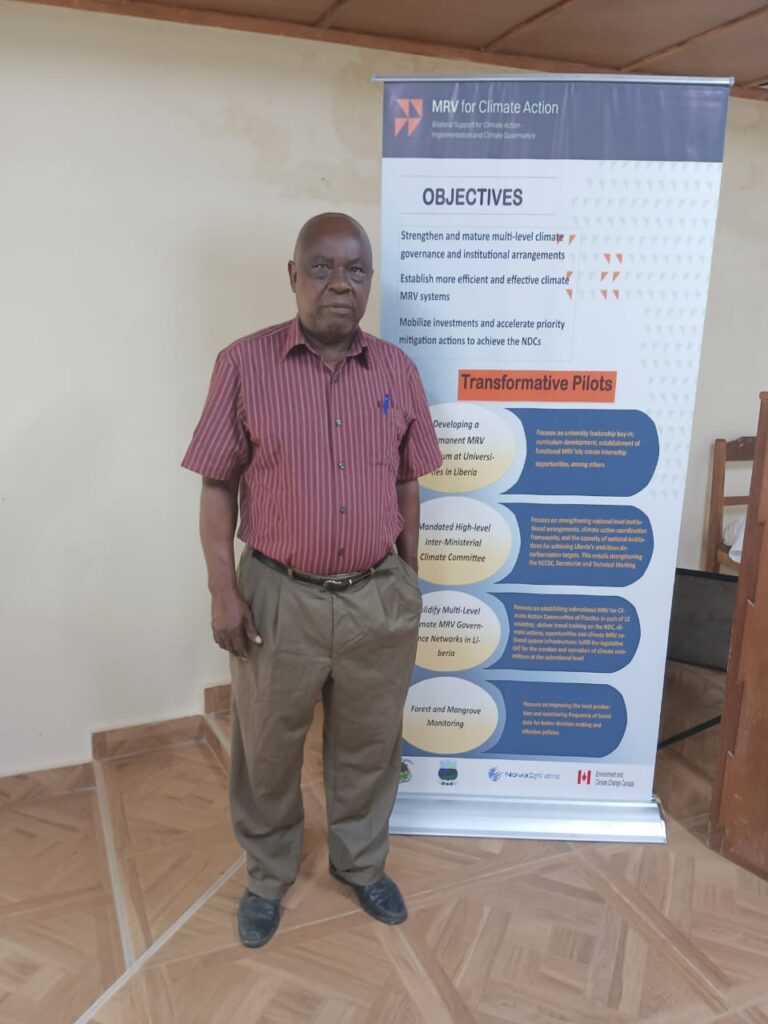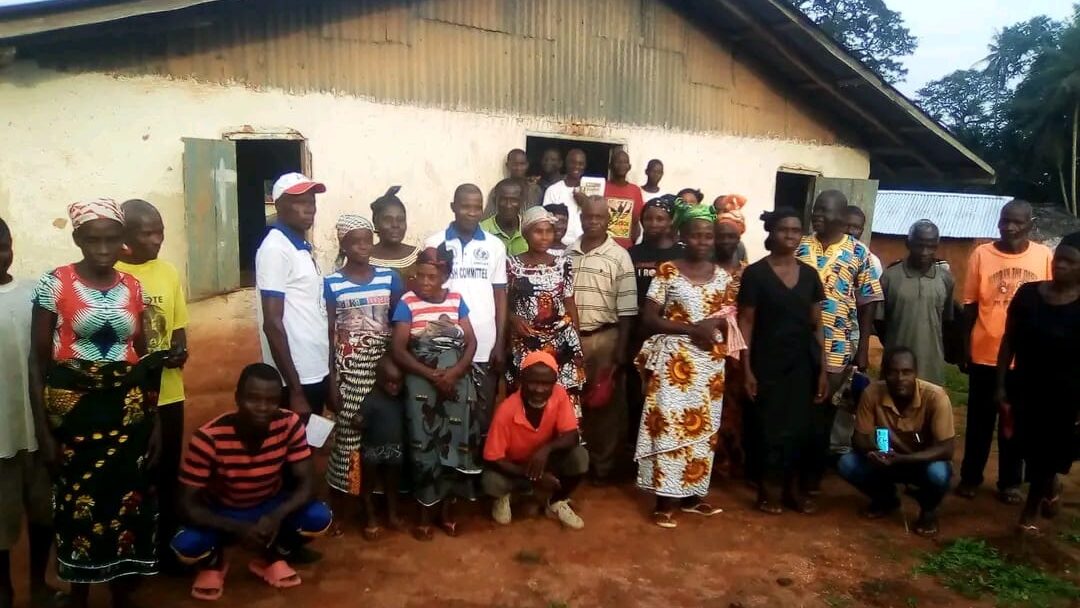Movement Matters #23 – Nyandeh Sieh, Friends of Franbarnie International (FOFI)
As a proud member of MCLD Liberia, Friends of Franbarnie International (FOFI) has been at the forefront of transformative initiatives in Southeastern Liberia. Committed to fostering community-led sustainable development, FOFI focuses on critical areas such as land management, climate-smart agriculture, and agricultural research.
This dynamic civil society organization is dedicated to enhancing education, advancing agricultural practices, promoting environmental stewardship, advocating for peace, and ensuring the sustainable management of natural resources. Read on as we highlight some of FOFI’s key achievements and activities that underscore its impactful work in empowering local communities in an interview with Executive Director Nyandeh Sieh.
Sera Bulbul: How did you become the Executive Director of FOFI? What led you here?
Nyandeh Sieh: I was born in an Indigenous community and got involved in community development activities during school. I co-founded a community-based organization called Light during my school days, and later became its president. I led various projects like cooperative farming and local clean-ups. This experience ignited my passion for community-led development and working with local communities.
After studying economics at the University of Liberia, I worked in several government roles focused on rural communities, including the Ministry of Internal Affairs, the National Food Assistance Agency, and the General Services Agency.
When Friends of Franbarnie International (FOFI) was established in 2005 to promote community-led development, I was appointed Executive Director, a role I’ve held with the support of a dedicated, hardworking team.

Sera: What inspires you?
Nyandeh Sieh: I’m inspired by local communities’ eagerness to plan and execute their development activities. I enjoy collaborating with people to solve problems. Although I face challenges, they often lead to innovation and motivation, encouraging me to keep moving forward.
Sera: How do you collaborate with other organizations in Liberia?
Nyandeh Sieh: FOFI is a member of the National Civil Society Council of Liberia (NCSCL). We collaborate with other members on community-led development projects, ensuring gender equity and social inclusion for men, women, youths and persons with disabilities.
Sera: What incoming activities does FOFI have that you are looking forward to?
Nyandeh Sieh: We have several exciting projects, some of which are pending:
- Generating Indigenous community climate change Resilient action knowledge in rural Liberia.
We aim to build knowledge on climate-resilient actions in rural Liberia.
The government of Liberia has granted logging and oil palm concessions in the southeastern region of the country, which plays host to a portion of the remaining upper Guinea rainforest.
These concessions threaten local agriculture and forests in an area where Indigenous and local communities depend on agriculture for their livelihood.
Indigenous communities here experience impacts of climate change such as season variation, droughts, and floods, all of which affect production and livelihood potential.
Our efforts will focus on:
- Creating equitable opportunities for women, men, girls, boys, and persons in need of special attention (PINSA) to share experiences on climate-resilient actions
- Strengthening local partnerships in accessing technical and financial resources for climate-resilient actions
- Enhancing community resilience against the negative impact of forest and wetland degradation through strengthened capacity to adopt climate-smart agriculture practices such as sustainable land management.
- Creating regional forums for research and information sharing on the effect of climate change and mitigating actions to reduce its impact, etc.
- The reinforcing effort of Flenneken community for the establishment of a reserved forest.
In response to the Flenneken Community’s request, FOFI is currently seeking a partnership to help reserve their forest, which is threatened by logging and oil palm concessions.
The operations of logging and oil palm concessions threaten wildlife resources and habitats, including endangered species.
The government of Liberia has enacted two laws that give local communities rights to their land, forest, and forest resources. Our goal is to support the community in managing 10,000 hectares of forest, promoting peaceful coexistence with concessionaires and ensuring legal recognition of their rights.
FOFI intends to implement activities aimed at:
- Conducting research within the concession area to determine the merits of claims and counter – claims with in the area and advise the parties accordingly.
- Conducting social economic surveys and resource reconnaissance within contested forest and others areas.
- Assisting the Flenneken community in demarcating their forest for appropriate resource management.
- Producing demarcation reports and maps, ensuring that the requisite legal instruments are available for furthers reference, etc.
These initiatives are driven by the communities themselves for climate adaptation and resilience.
Sera: Why did you join MCLD Liberia? How has it improved your work?
Nyandeh Sieh: FOFI joined MCLD Liberia because our goals align: empowering local communities to lead their own development. Being part of MCLD allows us to learn from others while sharing our expertise, enhancing FOFI’s visibility, and improving our work through valuable interactions.
Sera: What is your vision for the future of community led development in Liberia, and how do you see MCLD contributing?
Nyandeh Sieh: I envision a future where gender equity and social inclusion are prioritized in community-led development. MCLD can support this vision by supporting us in mobilizing both technical and financial resources.
FOFI’s other activities in the past five years include:
Enhancing Civic Engagement in Border Counties
With support from Counterpart International, FOFI improved civic engagement in Grand Kru, Rivergee, and Maryland Counties. The project fostered better collaboration between civil society organizations (CSOs) and local authorities, leading to improved service provision and reduced solo operations among CSOs in 2019.
Monitoring Free Prior Informed Consent (FPIC) Process
FOFI conducted research on the FPIC process in areas affected by Golden Veroleum and Maryland Oil Palm Plantation in Grand Kru and Maryland. Funded by Kumacaya/Earth Worm Foundation, the research revealed that existing agreements with communities were outdated and the FPIC process was insufficient. Additionally, few sustainable livelihood activities existed for affected community members.
Sustainable Land Usage in Flenneken
Flenneken Community sought FOFI’s collaboration to manage their land according to the 2009 Community Land Rights Law. FOFI facilitated discussions that ensured gender equity and social inclusion. The community decided to designate their land for three purposes: community farming, industrial use, and a reserved forest. They communicated this decision to the Government of Liberia through the Forestry Development Authority.
Participation in Climate Change Baseline Survey
In early 2024, FOFI participated in a Climate Change Baseline Survey, collecting data on climate change impacts across various sectors, including agriculture, health, and waste management. The survey aimed to identify ways to mitigate the adverse effects of climate change, particularly from forest degradation, and to assess compliance with forest regulations by concessions.


